Foreign Trade and Transport in Ivory Coast, Abidjan
Bouaké, Daloa, Korhogo, Yamoussoukro, Man (Business in Ivory Coast)

Ivory Coast (Côte d'Ivoire) “the land of Éburnie” is a West African country
- The largest Ivorian cities by population are:
- Ivory Coast is an African Frontier Market
- The main Ivorian export products are coffee and cocoa
- Currency of Ivory Coast: CFA Franc
- Ivory Coast share borders with Burkina Faso, Mali, Guinea, Liberia and Ghana
Transport and Logistics in Ivory Coast
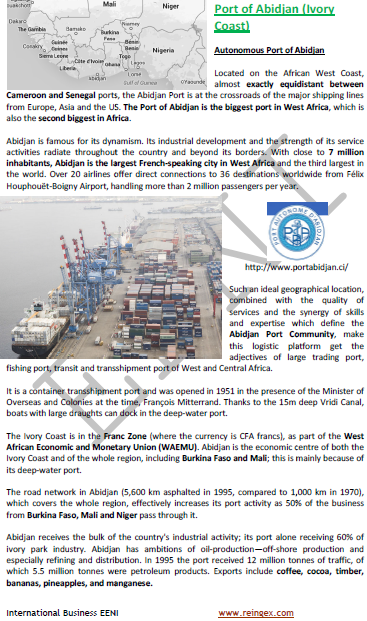
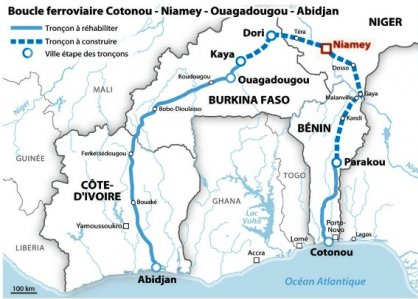
 Ivory Coast
Ivory Coast


More information: International Trade and Business in Ivory Coast, at EENI Global Business School Website.
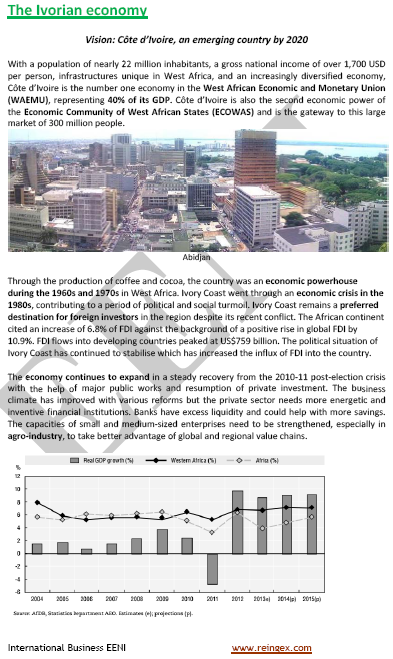
- Total Ivorian area: 322,462 km²
- Mount Nimba: 1,752 meters
- Ivorian rivers: Cavally, Sassandra, Bandama, Comoé
- Districts and regions of the Republic of Côte d'Ivoire
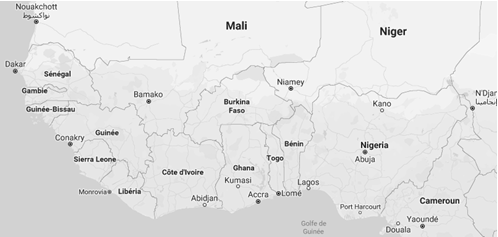
- Total Ivorian population: 26,5 million inhabitants
- 1998: 15 million inhabitants
- Average density of Ivory Coast: 83 inhabitants per square kilometre
- Calling code of Ivory Coast: 225
- Country code top-level domain of Ivory Coast: .ci
- History of Ivory Coast
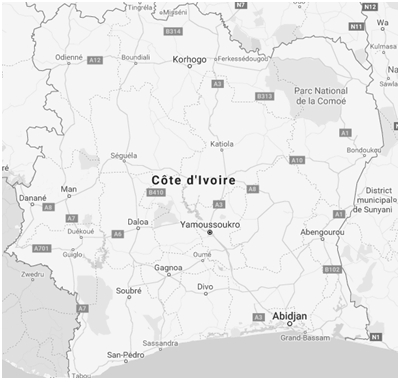

Trade and Business Organisations (Ivory Coast)
- Economic Community of West African States (ECOWAS)
- West African Economic and Monetary Union (WAEMU)
- U.S.-WAEMU Agreement
- Community of Sahel-Saharan States (CEN-SAD)
- EU-Ivory Coast Agreement
- Niger Basin Authority
- OHADA
- Mano River Union (MRU)
- United Kingdom-Ivory Coast Free Trade Agreement
- European Union-Ivory Coast Free Trade Agreement
- African Union
- AUDA-NEPAD
- Economic Commission for Africa
- African Development Bank

Religions and Global Business -
Religious diversity
Religion in Ivory Coast:
- African Traditional Religions
- Islam (43% of the Ivorian population)
- Christianity (34% of the Ivorian population)
Main languages and ethnicities:
The official language of Ivory Coast is French (70% of the Ivorian population). More than 60 languages in Ivory Coast
Ivorian African languages (in a million speakers):
More than 60 ethnicities live in Ivory Coast, the most important is the Kan
- Akan (42% of the Ivorian -8,5 millions), Centre and East of Ivory Coast and Ghana)
- Senufo (Voltaic people, Gur, 17% of the Ivorian, North of Ivory Coast)
- Baolués (3,9 million people, 23% of the Ivorian, Yamoussoukro)
- Malinke or Mande of the North (17%, North-East of Ivory Coast)
- Krou (11%, South-West and West-Centre)
- Mande of the South (10%, west of Ivory Coast)
- Bambara
- Dogon
Kple-Kple masks of the Baulé, Ivory Coast (Source: Jesús Arjona Muñoz, African Art Exhibition: “The Animal, A Sacred Symbol”)
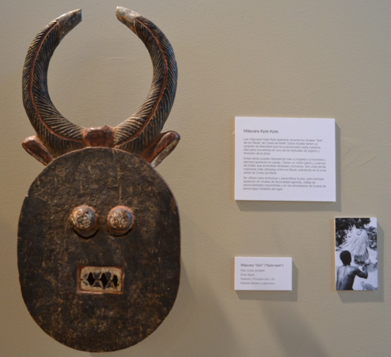
The Ivorian Historian Christophe Wondji: the black Christ of the lagoons (The prophet Harris)
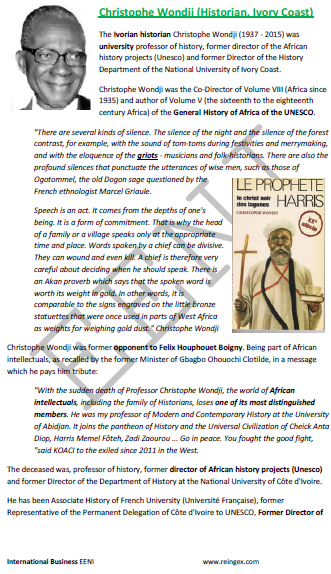
Higher Education in Ivory Coast
LMD System (Bachelor of Science-Master-Doctorate) (Ivorian Ministry of Higher Education and Research)
- University Félix Houphouët-Boigny (Abidjan)
- University Nangui Abrogoua (Abidjan)
- University Alassane Ouattara (Bouaké)
- University Jean Lorougnon Guédé (Daloa)
- University Péléforo Gbon Coulibaly (Korhogo)
Ivory Coast is a member of the African and Malagasy Council for Higher Education (CAMES)
 Côte d'Ivoire
Côte d'Ivoire
 Costa do Marfim
Costa do Marfim  Costa de Marfil
Costa de Marfil


 Tweet
Tweet